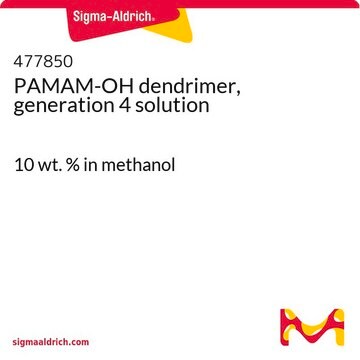482595
Poly(ethyleneimine) solution
average Mn ~1,200, average Mw ~1300 by LS, 50 wt. % in H2O
Synonym(s):
Ethyleneimine polymer solution, PEI
About This Item
Recommended Products
mol wt
average Mn ~1,200
average Mw ~1300 by LS
Quality Level
concentration
50 wt. % in H2O
refractive index
n20/D 1.454
viscosity
200-500 cP(25 °C)(lit.)
density
1.08 g/mL at 25 °C
SMILES string
N1CC1
InChI
1S/C2H5N/c1-2-3-1/h3H,1-2H2
InChI key
NOWKCMXCCJGMRR-UHFFFAOYSA-N
Looking for similar products? Visit Product Comparison Guide
General description
Application
Signal Word
Warning
Hazard Statements
Precautionary Statements
Hazard Classifications
Aquatic Chronic 2 - Skin Sens. 1
Storage Class Code
10 - Combustible liquids
WGK
WGK 2
Choose from one of the most recent versions:
Already Own This Product?
Find documentation for the products that you have recently purchased in the Document Library.
Customers Also Viewed
Articles
Professor Yoshiki Katayama (Kyushu University, Japan) discusses recent advances in drug delivery systems and strategies that exploit the EPR effect, with a special focus on stimuli-responsive systems based on novel materials.
Gene therapy has become one of the most discussed techniques in biomedical research in recent years.
We present an article that discusses two applications in particular; first, using these layers as polyelectrolyte membranes to control permeability.
Microfluidic assembly improves polyamine nanoencapsulation of nucleic acids, overcoming challenges like polydispersity and poor reproducibility.
Our team of scientists has experience in all areas of research including Life Science, Material Science, Chemical Synthesis, Chromatography, Analytical and many others.
Contact Technical Service




![[2-(Methacryloyloxy)ethyl]dimethyl-(3-sulfopropyl)ammonium hydroxide 95%](/deepweb/assets/sigmaaldrich/product/structures/217/219/73c91e1c-0ee4-4b3d-bead-a6dc3d09d1da/640/73c91e1c-0ee4-4b3d-bead-a6dc3d09d1da.png)





